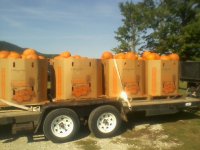And they say houses are money pits :laughing:
The business I'm with just had to invest in a new UV treatment for commercial cider sales.
Sunk a ton of money into old system prior to that.
And had to buy a refrigerator van to make cold deliveries now
Two refrigeration compressors had to be replaced within 6 months of each other since last winter.
Have to pay a fee for the required GAP inspections to keep the commercial accounts in good standing.
(There are some available state subsidized rebate programs for small farms though.)
Huge amount of increased record keeping now for traceability/liability.
Had to bring packing house into new compliance with all washable and disinfectable surfaces ( FRP, Azek lumber, commercial tile etc.)
Employment wages have been increased by state law.
Overall farmer market fees have increased and now require a liability insurance, and permits and local licensing to conduct certain business ventures.
Have to pay quarterly estimated sales on my out of state marketing sales.
Pesticide prices, fertilizer and greenhouse materials continue to increase annually.
Installed a code required commercial ventalation hood and Ansul fire suppression system to make donuts, was more than twice as much than the donut machine cost.
Bakery license
BOH approved kitchen space
3 bay sink
Commercial hot water heater
Cast iron DWV
Truck shipping on some packaging items has become so expensive we actually go on road trips to pick up certain items now.
Old delivery van failed to pass state inspection this season. (had frame problems)
Bought new delivery van.
Scrapped '99 Chevy 3/4 ton pickup truck this season. (Thoroughly killed that hauling and towing)
Bought used Ford dually diesel dump truck
Repaired dump truck numerous times :laughing:
3K repair job on one JD tractor this Spring (new hydraulic pump)
May be the last year for greenhouse tomatoes (3 houses worth) the price of peat mixture material is thru the roof
Got state grant towards new farm store building.
Finished building so far has cost 3x as much as grant

Still not done!

I just never ends, sourcing the specific raw material to create holiday items like wreaths is becoming cost prohibitive and more difficult to obtain. Don't know how long that is going to continue.
Picked up huge out town commercial apple account Yea!
Have to make weekly palletized delivery now to customer specification..
Box truck broke down 2 week wait on part
Needed to rent truck.
Had to replace the floor of box on old delivery truck last season. (that rotted away transporting wet greenhouse products over time)
Can source cabbage, pumpkin, onion, and potatoes so cheap its really not worth growing.
Currently have invested heavily in small fruit strawberry, blueberry, raspberry, and grape production.
Very labor intensive. Lots of field infrastructure involved the Blueberry raspberry and grape, strawberries are inside greenhouse structures.
Plasticulture for other garden crops.
Gladious by direct planting, weeding is seriously labor intensive.
Greenhouse and tunnel plastics have to be replaced on a rotating basis.
They say the average age of US farmer is something like 55 except for a few temp hires during harvest season and a fairly steady Central American crew of 4 fellows, nobody but one other is much younger than that.

